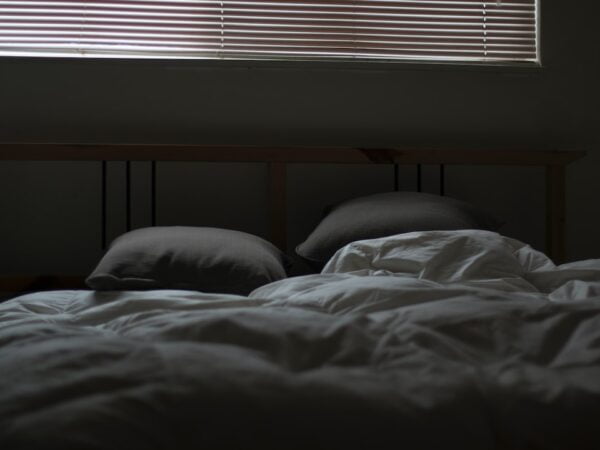
The Importance of Prioritizing Sleep and Relaxation for a Healthier Life
Sleep and relaxation are essential components of a healthy lifestyle. In today’s fast-paced world, many people prioritize work and other responsibilities over getting enough rest and taking time to unwind. However, neglecting sleep and relaxation can have detrimental effects on both physical and mental health. In this article, we will explore the importance of sleep and relaxation for overall well-being, the negative effects of sleep deprivation, the benefits of prioritizing relaxation, the connection between sleep and relaxation, practical tips for improving sleep quality, relaxation techniques to try, the role of exercise in promoting sleep and relaxation, and how to create a personalized sleep and relaxation routine.
Key Takeaways
- Sleep is crucial for a healthier life, and lack of sleep can have negative effects on health.
- Prioritizing relaxation can have numerous benefits for overall well-being.
- There is a strong connection between sleep and relaxation, and both should be prioritized for optimal health.
- Tips for a better night’s sleep include creating a comfortable sleep environment and establishing a consistent sleep schedule.
- Relaxation techniques such as deep breathing and meditation can help promote relaxation and better sleep.
The Importance of Sleep for a Healthier Life
Getting enough sleep is crucial for maintaining good health. Sleep plays a vital role in various bodily functions, including mood regulation, cognitive function, and immune system function. When we sleep, our bodies repair and rejuvenate themselves, allowing us to wake up feeling refreshed and ready to take on the day.
One of the most noticeable benefits of getting enough sleep is improved mood. Lack of sleep can lead to irritability, mood swings, and increased stress levels. On the other hand, a good night’s sleep can help regulate emotions and improve overall well-being.
In addition to mood regulation, sleep also plays a crucial role in cognitive function. Studies have shown that adequate sleep is essential for memory consolidation, learning, problem-solving, and decision-making. When we are well-rested, our brains are better equipped to process information and perform at their best.
Furthermore, sleep is essential for a strong immune system. During sleep, our bodies produce cytokines, which are proteins that help fight off infections and inflammation. Lack of sleep can weaken the immune system, making us more susceptible to illnesses such as the common cold or flu.
Lack of Sleep and Its Negative Effects on Health
Not getting enough sleep can have serious consequences for our health. Chronic sleep deprivation has been linked to an increased risk of various chronic diseases, including obesity, diabetes, cardiovascular disease, and even certain types of cancer. Lack of sleep can disrupt the body’s hormonal balance, leading to weight gain and metabolic dysregulation.
Sleep deprivation also impairs judgment and cognitive function. Studies have shown that sleep-deprived individuals have slower reaction times, decreased attention span, and impaired decision-making abilities. This can have serious implications for tasks that require focus and concentration, such as driving or operating machinery.
Furthermore, lack of sleep can negatively impact productivity and performance. When we are sleep-deprived, we are more likely to make mistakes, have difficulty concentrating, and experience decreased creativity. This can affect our work performance and overall quality of life.
The Benefits of Prioritizing Relaxation
| Benefits of Prioritizing Relaxation | Metric |
|---|---|
| Reduced stress levels | Lower cortisol levels |
| Better sleep quality | Increased hours of deep sleep |
| Improved mental health | Reduced symptoms of anxiety and depression |
| Increased productivity | Higher quality work output |
| Enhanced creativity | Increased ability to generate new ideas |
In addition to getting enough sleep, it is important to prioritize relaxation in our daily lives. Relaxation helps reduce stress levels, improve mental health, and promote better sleep.
Stress is a common problem in today’s society, and chronic stress can have detrimental effects on both physical and mental health. Taking time to relax allows the body to activate its natural relaxation response, which helps counteract the effects of stress. Relaxation techniques such as deep breathing, meditation, and progressive muscle relaxation can help calm the mind and body, reducing stress levels and promoting a sense of well-being.
Furthermore, relaxation is essential for maintaining good mental health. It allows us to disconnect from the demands of daily life and recharge our batteries. Taking time to relax can help reduce symptoms of anxiety and depression, improve mood, and enhance overall mental well-being.
Lastly, relaxation promotes better sleep. When we are relaxed, it is easier for us to fall asleep and stay asleep throughout the night. Incorporating relaxation techniques into our bedtime routine can help signal to the body that it is time to wind down and prepare for sleep.
The Connection Between Sleep and Relaxation
Sleep and relaxation are closely interconnected. When we are relaxed, it is easier for us to fall asleep and stay asleep throughout the night. On the other hand, when we are sleep-deprived, it can be more challenging to relax and unwind.
When we are well-rested, our bodies are better equipped to handle stress and regulate emotions. This makes it easier for us to relax and engage in activities that promote relaxation, such as reading a book, taking a bath, or practicing mindfulness.
Conversely, when we are sleep-deprived, our bodies are in a state of heightened stress, making it more difficult to relax. Lack of sleep can lead to increased anxiety and irritability, making it harder to find peace and calm.
Therefore, it is important to prioritize both sleep and relaxation in order to achieve optimal well-being. By getting enough sleep and incorporating relaxation techniques into our daily routine, we can create a positive cycle where sleep promotes relaxation and relaxation promotes better sleep.
Tips for a Better Night’s Sleep
Improving sleep quality starts with establishing healthy sleep habits. Here are some practical tips for getting a better night’s sleep:
1. Establish a bedtime routine: Going to bed and waking up at the same time every day helps regulate the body’s internal clock. Establishing a consistent bedtime routine can signal to the body that it is time to wind down and prepare for sleep.
2. Create a comfortable sleep environment: Make sure your bedroom is cool, dark, and quiet. Invest in a comfortable mattress and pillows that support your body’s natural alignment. Consider using blackout curtains or a white noise machine to block out any external distractions.
3. Avoid caffeine and electronics before bed: Caffeine is a stimulant that can interfere with sleep. Avoid consuming caffeine-containing beverages such as coffee or tea in the evening. Additionally, the blue light emitted by electronic devices can suppress the production of melatonin, a hormone that regulates sleep. Avoid using electronic devices at least an hour before bed.
4. Practice relaxation techniques: Engaging in relaxation techniques before bed can help calm the mind and prepare the body for sleep. Deep breathing, meditation, and progressive muscle relaxation are all effective techniques for promoting relaxation and better sleep.
5. Limit daytime napping: While a short power nap can be beneficial, excessive daytime napping can interfere with nighttime sleep. If you feel the need to nap during the day, try to limit it to 20-30 minutes and avoid napping too close to bedtime.
Relaxation Techniques to Try
In addition to incorporating relaxation techniques into your bedtime routine, it can be helpful to practice relaxation throughout the day. Here are some examples of relaxation techniques that you can try:
1. Deep breathing: Deep breathing is a simple yet effective technique for promoting relaxation. Sit or lie down in a comfortable position and take slow, deep breaths in through your nose and out through your mouth. Focus on your breath and let go of any tension or stress with each exhale.
2. Meditation: Meditation involves focusing your attention and eliminating the stream of thoughts that may be running through your mind. Find a quiet place where you can sit comfortably and close your eyes. Focus on your breath or repeat a calming mantra or phrase. Allow any thoughts or distractions to come and go without judgment.
3. Progressive muscle relaxation: Progressive muscle relaxation involves tensing and then releasing different muscle groups in the body to promote relaxation. Start by tensing the muscles in your toes and then gradually work your way up to your head, focusing on one muscle group at a time. Hold the tension for a few seconds and then release, allowing the muscles to relax completely.
4. Guided imagery: Guided imagery involves using your imagination to create a calming mental image. Close your eyes and imagine yourself in a peaceful and serene environment, such as a beach or a forest. Visualize the sights, sounds, and smells of this place, allowing yourself to fully immerse in the experience.
The Role of Exercise in Promoting Sleep and Relaxation
Exercise is not only beneficial for physical health but also plays a crucial role in promoting sleep and relaxation. Regular physical activity can help regulate sleep patterns, reduce stress levels, and improve overall well-being.
Engaging in moderate-intensity aerobic exercise, such as brisk walking, swimming, or cycling, has been shown to improve sleep quality. Exercise helps regulate the body’s internal clock, making it easier to fall asleep and stay asleep throughout the night. It also increases the production of endorphins, which are natural mood boosters that can help reduce stress and promote relaxation.
In addition to aerobic exercise, incorporating strength training into your routine can also have positive effects on sleep and relaxation. Strength training helps build muscle mass, which can improve overall physical function and reduce the risk of chronic diseases. It also promotes the release of growth hormones, which are important for tissue repair and recovery during sleep.
To reap the benefits of exercise for sleep and relaxation, aim for at least 150 minutes of moderate-intensity aerobic activity or 75 minutes of vigorous-intensity aerobic activity per week. Additionally, incorporate strength training exercises at least two days a week.
Creating a Sleep and Relaxation Routine
Creating a personalized sleep and relaxation routine is essential for maintaining good sleep hygiene and promoting overall well-being. Here are some steps to help you create a routine that works for you:
1. Assess your current sleep habits: Start by evaluating your current sleep habits and identifying any areas that need improvement. Are you getting enough sleep? Do you have a consistent bedtime routine? Are there any factors that may be interfering with your sleep, such as caffeine or electronic devices?
2. Set goals: Determine how much sleep you need to feel rested and set a goal for yourself. Aim to establish a consistent sleep schedule, going to bed and waking up at the same time every day. Set goals for incorporating relaxation techniques into your daily routine as well.
3. Establish a bedtime routine: Create a relaxing bedtime routine that signals to your body that it is time to wind down and prepare for sleep. This may include activities such as reading a book, taking a warm bath, or practicing relaxation techniques.
4. Create a sleep-friendly environment: Make sure your bedroom is cool, dark, and quiet. Remove any distractions that may interfere with your sleep, such as electronic devices or excessive noise. Invest in a comfortable mattress and pillows that support your body’s natural alignment.
5. Incorporate relaxation throughout the day: Take breaks throughout the day to engage in relaxation techniques such as deep breathing or meditation. This can help reduce stress levels and promote a sense of calm.
6. Prioritize exercise: Make physical activity a priority in your daily routine. Aim for at least 150 minutes of moderate-intensity aerobic activity or 75 minutes of vigorous-intensity aerobic activity per week, as well as strength training exercises at least two days a week.
7. Be consistent: Stick to your sleep and relaxation routine as much as possible, even on weekends or during vacations. Consistency is key for maintaining good sleep hygiene and reaping the benefits of relaxation.
Making Sleep and Relaxation a Priority for a Healthier Life
In conclusion, sleep and relaxation are essential components of a healthy lifestyle. Getting enough sleep and taking time to relax are crucial for maintaining good physical and mental health. Sleep promotes improved mood, cognitive function, and immune system function, while relaxation helps reduce stress levels, improve mental well-being, and promote better sleep.
Neglecting sleep and relaxation can have negative effects on health, including an increased risk of chronic diseases, impaired judgment, and decreased productivity. Therefore, it is important to prioritize both sleep and relaxation in our daily lives.
By following practical tips for improving sleep quality, incorporating relaxation techniques into our routine, engaging in regular physical activity, and creating a personalized sleep and relaxation routine, we can make sleep and relaxation a priority for a healthier life. Remember, taking care of yourself is not selfish but necessary for overall well-being.
FAQs
What is sleep?
Sleep is a natural state of rest for the body and mind, characterized by a reduction in consciousness, decreased muscle activity, and a lowered metabolic rate.
Why is sleep important?
Sleep is essential for physical and mental health. It helps the body repair and regenerate, strengthens the immune system, and improves cognitive function, memory, and mood.
How much sleep do I need?
The amount of sleep needed varies by age and individual. Adults typically need 7-9 hours of sleep per night, while children and teenagers require more.
What is relaxation?
Relaxation is a state of calmness and reduced tension in the body and mind. It can be achieved through various techniques such as deep breathing, meditation, and yoga.
Why is relaxation important?
Relaxation helps reduce stress, anxiety, and tension in the body and mind. It can also improve sleep quality, boost mood, and enhance overall well-being.
What are some relaxation techniques?
Some relaxation techniques include deep breathing, progressive muscle relaxation, guided imagery, meditation, yoga, and massage.
How often should I practice relaxation techniques?
It is recommended to practice relaxation techniques daily, even if only for a few minutes. Regular practice can help build resilience to stress and improve overall well-being.

















